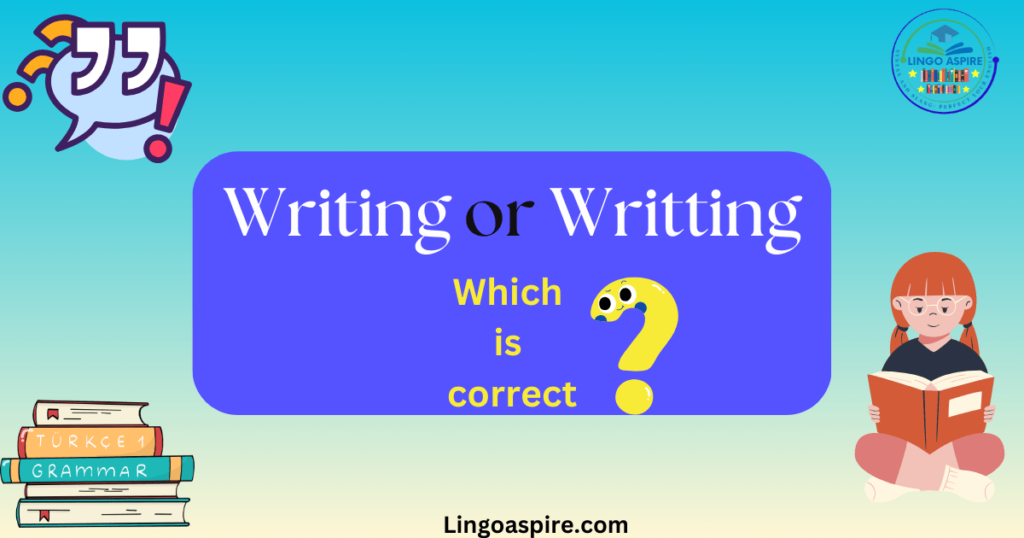English spelling can be tricky, especially when it comes to commonly confused words like “writing” and “writting.” Many people wonder which one is correct, and this confusion can lead to misspellings that can hurt your credibility as a writer. In this comprehensive guide, we’ll take a deep dive into why the confusion happens, what makes “writing” the correct choice, and how to avoid similar mistakes in your writing. Whether you’re working on academic writing, creative writing, or content writing, understanding the rules and patterns behind the words will help you improve your writing skills.
Why Does the Confusion Between “Writing” and “Writting” Happen?
The English language is notorious for its inconsistencies. One of the most common sources of confusion when it comes to spelling is the doubling of consonants before adding “-ing.” Many words follow a pattern where, if a single consonant is preceded by a single vowel, the consonant is doubled before adding “-ing,” like in hitting and sitting. However, writing does not follow this pattern because the verb “write” doesn’t need the extra consonant.
This phenomenon occurs because English words often have a variety of rules and exceptions, which makes learning spelling challenging. People may confuse writing with other words that do follow the double-consonant rule, leading to the incorrect form writting.
“Writing” vs. “Writting”: Which One is Correct?
Out of the two, only writing is correct. The orthographic rule for creating the present participle of the verb “write” dictates that only one “t” should be used. The confusion comes from similar words like hitting and running, where the consonant is doubled. However, writing doesn’t require that extra consonant because of its unique spelling pattern.
Mistaking writing for writting is a common error, but with some attention to detail, it’s an easy fix. Once you know the rule, you can avoid the confusion and focus on improving other aspects of your writing process.
The Meaning of “Writing” in Different Contexts
At its core, writing refers to the process of creating text. However, its meaning can vary depending on the context in which it’s used. In general, writing can mean:
| Activity | Description |
|---|---|
| Creating Letters or Symbols | Writing letters or symbols on a surface, such as paper, a computer screen, or even a wall. |
| Composing Written Text | Writing text for communication, such as in a letter, an article, or a book. |
| Documenting Thoughts and Ideas | Recording thoughts, ideas, or events in both formal and informal settings. |
Understanding these nuances of writing will help you use the word correctly in different writing techniques.
The Importance of Proper Spelling in Writing
Spelling errors, like using writting instead of writing, can disrupt the flow of your work and make it harder for readers to understand your message. Proper spelling, along with other writing skills, is essential for clear communication. When you master spelling, it adds to the effectiveness and clarity of your writing.
In professional and academic settings, spelling mistakes can diminish your credibility. Consistently using the correct form of words like writing not only improves your grammar but also enhances the quality of your written work.
Words That Follow the Same Pattern as “Writing”
To fully understand why writing doesn’t require a double consonant, let’s look at other words that follow a similar pattern. These are words where the base verb ends in a vowel plus a consonant, but the consonant does not double before adding “-ing.” Some examples include:
| Verb | Present Participle (Correct Form) | Incorrect Form |
|---|---|---|
| write | writing | writting |
| hope | hoping | hopings |
| skate | skating | skating |
| name | naming | naming |
Notice how in all these cases, the consonant doesn’t double. This orthographic pattern explains why writing is the correct spelling. It’s important to remember that not all words follow the doubling rule, and understanding these patterns can help you avoid spelling errors.
The Evolution of the Word “Writing”
The word writing has evolved over time. Its origins can be traced back to the Old English word writan, which means “to inscribe” or “to scratch.” As writing systems developed, this term expanded from basic inscriptions to the more complex process of composing texts.
Over centuries, writing became a fundamental skill, first used by ancient civilizations like the Egyptians and Sumerians. In modern times, it has grown to include everything from creative writing and academic essays to digital writing and content creation.
The Role of “Writing” in Academic and Professional Settings
Whether you are drafting an academic paper, research project, or business proposal, writing is a critical skill. In academic writing, clarity and accuracy are essential, and misspellings like writting can make your work seem less professional. Additionally, good writing techniques like sentence structure, grammar, and word choice will elevate your work and help it resonate with readers.
In the professional world, written communication is often the primary method of exchanging information. Emails, reports, and presentations all rely on well-developed writing skills. Therefore, using the correct form of writing and following orthographic rules is important for establishing credibility and trust with your audience.
Common Mistakes People Make When Writing
There are several common errors that writers make when it comes to spelling. Some of these include:
| Issue | Description | Example |
|---|---|---|
| Homophone Confusion | Confusing words that sound alike but have different meanings. | There (location) vs. Their (possessive) |
| Misspelling | Using an incorrect form of a word due to confusion with similar words. | Writting (incorrect) vs. Writing (correct) |
| Omitting Letters | Forgetting to add necessary letters in a word. | Definately (incorrect) vs. Definitely (correct) |
| Incorrect Word Choice | Using words that don’t fit the context of a sentence. | Affect (incorrect) vs. Effect (correct) |
These are frequent errors that writers often make, and being aware of them can help improve your writing process and final product.
The Role of the Silent Letter in Spelling
In English, many words contain silent letters that don’t change the pronunciation of the word but do affect its spelling. For example, the “e” at the end of words like write and love is silent but necessary for correct spelling.
Understanding these spelling rules can help you avoid making mistakes like writting, as you’ll be more attuned to the subtleties of orthography and pronunciation.
How to Improve Your Writing and Avoid Misspellings
Improving your writing skills involves more than just learning how to spell words correctly. It also includes expanding your vocabulary, practicing grammar rules, and refining your sentence structure. To avoid misspellings and improve your overall writing:
| Tip | Description |
|---|---|
| Read Widely | Exposure to well-written material will help you recognize correct spelling and sentence structure. |
| Proofread Your Work | Always check for spelling errors and typos before submitting or publishing your work. |
| Use Spelling and Grammar Tools | Tools like Grammarly or Microsoft Word’s built-in spell checker can help catch common spelling mistakes. |
| Practice Regularly | Consistent writing practice helps solidify spelling rules and writing techniques. |
By consistently applying these practices, you’ll be able to improve both your drafting skills and your writing process, leading to clearer, more polished work.
Pronunciation and Spelling: Why They Don’t Always Match
A major challenge in English is that pronunciation doesn’t always align with spelling. For example, writing and writting may seem phonetically similar, but only one is spelled correctly. This is because English has a phonetic rule that does not always dictate spelling. The influence of French, Latin, and other languages has contributed to the sometimes non-phonetic nature of English spelling.
By learning these spelling patterns, you’ll better understand when to apply certain rules, such as when a consonant doubles and when it doesn’t. Knowing how spelling rules work will also make it easier to understand why words like writing have their particular spelling.
Writing Tips for Avoiding Common Spelling Mistakes
To avoid misspelling and other common errors, here are a few simple writing tips:
| Tip | Description |
|---|---|
| Use Spelling Rules | Know when consonants should be doubled, and when they should not. |
| Pay Attention to Silent Letters | Understand which letters are silent in words like writing and love. |
| Be Aware of Homophones | These are words that sound the same but have different meanings, like their and there. |
| Learn from Mistakes | When you make an error, like writting, look up the correct spelling and understand why it’s wrong. |
By following these tips, you’ll be able to improve your writing and avoid common spelling mistakes.
Conclusion: Mastering the Correct Spelling of “Writing”
In conclusion, the confusion between writing and writting happens because of misunderstandings of English spelling rules and grammar rules. Writing is the correct form, and once you understand why writting is incorrect, you can avoid this common misspelling concern. By recognizing the orthographic patterns in English, paying attention to grammar rules, and practicing good writing techniques, you’ll ensure your work is clear, professional, and error-free.
Whether you’re writing an academic paper, creative piece, or content article, mastering the art of spelling and writing will help you communicate effectively. So, keep practicing, double-check your work, and embrace the beauty of writing—the correct way!
Sources
Certainly! Here are three sources that provide information on the correct spelling of “writing” and common spelling mistakes:
- Grammar Palette: This article explains why “writing” is the correct spelling and discusses common spelling mistakes.
- Ask Difference: This source clarifies the correct spelling of “writing” and provides insights into common spelling errors.
- Writing Tips: This article offers guidance on the correct spelling of “writing” and addresses common spelling mistakes.
These sources should help clarify the correct spelling and usage of “writing.”







